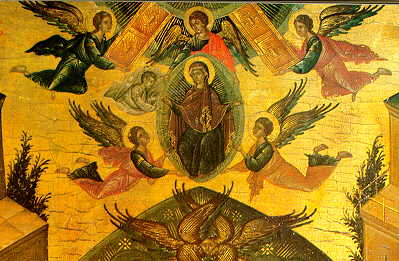A Letter to Alessandro

A young man asked if I might reflect with him on the practice of Total Consecration to the Blessed Virgin Mary, following the doctrine of Saint Louis-Marie Grignion de Montfort. I remembered having written this little reflection in the form of a letter for Alessandro — who has since become a monk! — and thought that I would post it again. I trust that the young seeker will also find it helpful.
14 August 2009
Saint Maximilian Maria Kolbe, priest and martyr
Vigil of the Assumption of the Blessed Virgin Mary
Dear Alessandro,
With your characteristic candor and enthusiasm, you asked me a few days ago about the various ways of consecrating oneself to the Blessed Virgin Mary. You referred, in particular, to Saint Louis-Marie de Montfort’s plan for total consecration to Mary, and to the Act of Consecration composed by today’s Saint Maximilian Maria Kolbe. I prayed this morning about your question and found myself reflecting on the meaning of consecration. You know, of course, that Pope John Paul II proposed the word affidamento, which one might translate as entrustment. (Read Msgr. Arthur B. Calkins’ book: Totus Tuus: John Paul II’s Program of Marian Consecration & Entrustment.) Personally, I think that, at least in English, entrustment rather weakens the notion of consecration, especially when one approaches it through the lens of Saint John’s Gospel and through Saint Paul’s Epistles.
 Consecration can mean two things: it can refer to the action by which one hands oneself over to God in imitation of Christ:
Consecration can mean two things: it can refer to the action by which one hands oneself over to God in imitation of Christ:
The life I now live in the flesh I live by faith in the Son of God, who loved me and gave Himself for me (Gal 2:20).
Walk in love, as Christ loved us and gave Himself up for us, a fragrant offering and sacrifice to God (Eph 5:2).
Christ loved the Church and gave Himself up for her that He might sanctify her (Eph 5:25).
You can see that “handing oneself over” “giving oneself up” is intrinsically linked to the idea of sacrifice, which, in turn, is related to sanctification or consecration.
And for their sake I consecrate Myself, that they also may be consecrated in truth (Jn 17:19).
 The meaning of “to consecrate” in this context is “to sacrifice.” One might render the above verse correctly as:
The meaning of “to consecrate” in this context is “to sacrifice.” One might render the above verse correctly as:
And for their sake I sacrifice Myself, that they also may be sacrificed in truth (Jn 17:19).
You may find the equivalence of to consecrate and to sacrifice a little frightening. I understand your apprehension. To sacrifice comes from two Latin roots: sacer (sacred) and facio (to do or make). In Book Ten of the The City of God, Saint Augustine explains that anything or anyone placed upon the altar becomes sacrificium; it or he becomes consecrated, that is, radically and irreversibly made over/given up/handed over to God. This is what Saint Paul says:
I appeal to you therefore, brethren, by the mercies of God, to present your bodies as a living sacrifice, holy and acceptable to God, which is your spiritual worship (Rom 12:1).
There are two moments in every sacrificium or consecration. The first moment corresponds to the Offertory of the Mass. One hands oneself over, offering to God one’s body and soul, one’s past, present, and future. Here the action is human; it engages one’s free will and, normally, finds expression in the formulation of an “act of consecration.”
From the human perspective, this is the active mode of consecration. One must hold fast, nonethless, to the truth that every good action is a free response, made possible by grace, to a divine solicitation of the heart. One consecrates oneself at the prompting of the Holy Spirit, and in the grace of obedience to that inner prompting. I consecrate myself.
The second moment corresponds to the consecration of the Mass. One is acted upon by the Holy Spirit sent by the Father at the invocation of the Son. Here the action is divine, not human. The agent is God Himself, the work of sanctification/consecration being fittingly attributed to the Holy Spirit. I am consecrated.
Why would one risk an act of consecration, knowing full well that it will bring upon the one making it a configuration to Christ Jesus in the mystery of His sacrifice? One dares to consecrate oneself because it is the only response worthy of the love of God.
He who did not spare his own Son but gave him up for us all, will he not also give us all things with him? (Rom 8:32)
To be consecrated to the Sacred Heart of Jesus, and to be abandoned or given over to His love are, in effect the same thing. By consecrating oneself to the Sacred Heart of Jesus is to hand oneself over to His merciful love. This action on our part allows Our Lord to act upon us freely in view of the glory of His Father, the fruitfulness of His Church, and our own sanctification. Our Lord seeks souls who will hand themselves over to His love, just as He handed himself over to His Father’s love upon the altar of the Cross. This is where Marian consecration comes in. The most effective way of handing oneself over to Jesus is through Mary. The consecration of oneself, made in her virginal hands, is immediately “handed over” to Jesus, the Eternal High Priest, who, in turn, unites it to His own perfect oblation to the Father.

There are many ways of making this act of consecration to Our Lady. This past year I renewed my own Marian consecration by using the prayer of Saint Ildephonsus of Toledo. The beautiful prayer of consecration of Père Croset has marked my own life profoundly. You will find it here.
The act of consecration should not be done lightly. One should take counsel of one’s spiritual father and prepare for the act of consecration over a certain period of time. I recommend that the act of consecration coincide with one of Our Blessed Lady’s liturgical feasts. An act of consecration should be renewed frequently and need not always be renewed using the same formula. The best way of demonstrating what an act of consecration might look like is by sharing with you the one that I wrote this morning during my prayer. Here it is:
O Immaculate Virgin Mary,
beloved Mother of our Lord Jesus Christ,
Mother of the Church and Mediatrix of All Graces,
I want to “hand myself over” to thee,
just as thy servant Saint Maximilian Maria Kolbe “handed himself over” to thee
in an inspired act of consecration.
Thou art my Mother;
I am not afraid of trusting thee with my life
Thou art my Advocate;
I am confident that thou wilt plead for me
until I am safely with thee in heaven.
Thou art my Queen;
all power in heaven and on earth
hath been given thee by thy Divine Son,
Creator, Redeemer, and King of the Universe.
Thou art the Coredemptrix participating fully in the sacrifice of thy Son;
all that is made over to thee, thou handest over to Him
to be taken up into His oblation
for the glory of the Father and the salvation of souls.
There is no more effective way of entering into the Work of Redemption
than by consecrating myself to thee.
I am confident that thy Immaculate Heart will so order all things
that by giving myself to thee,
I will be handed over to thy Son, Priest and Victim,
to pass over, in the unity of the Holy Ghost, with Him into the glory of the Father
where thou waitest for the homecoming
of all thy sons and daughters.
O clement! O loving! O sweet Virgin Mary!
I hope that this letter responds, in some way, to your questions about Marian consecration. I bless you and keep you in my prayer.
Father

Thank you, Father Mark!